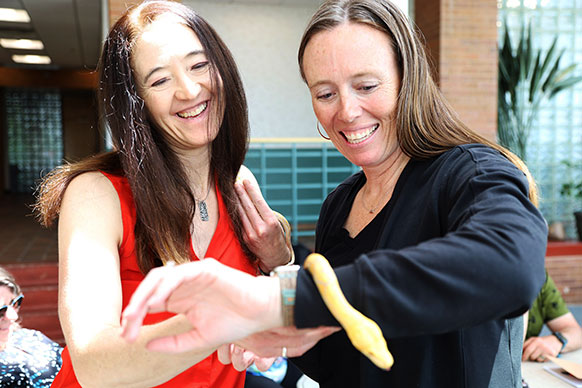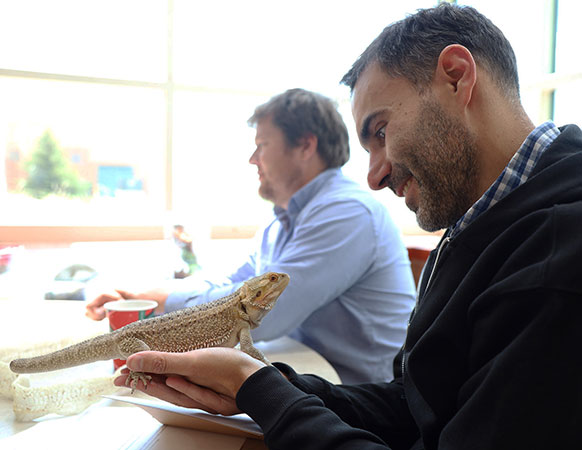UW, Other Wyoming Educators Gather to Share Innovative Teaching and Learning
Published June 24, 2025

Rachel Watson, left, director of UW’s Learning Actively Mentoring Program, examines a snake held by Sarah Pauley, of Western Wyoming Community College, during the annual Wyoming Learning Communities for Pedagogies of Innovative Excellence gathering in Rock Springs. (Aubrey Edwards Photo)
Educators from across Wyoming convened recently in Rock Springs to share innovative teaching strategies developed throughout the 2024-25 academic year.
Organized by the University of Wyoming Science Initiative’s Learning Actively Mentoring Program (LAMP), the annual Wyoming Learning Communities for Pedagogies of Innovative Excellence gathering serves as a showcase for learning advances in hands-on education and other methods designed to help students leverage their individual strengths. The learning communities, facilitated by LAMP and composed of instructors from both K-12 and higher education, meet biweekly during the school year.
Wyoming’s network of learning communities spans the state, with Northwest College leading the way as the largest and longest-standing group. Founded in 2021, Northwest’s community now boasts 10 members. Since then, additional communities have been built: Laramie County Community College (LCCC) and Western Wyoming Community College (Western) joined in fall 2023 and spring 2024, respectively, with six and seven members each. Casper College and UW-Casper followed in fall 2024 with eight educators. The newest community, launched this summer at Eastern Wyoming College (EWC), began with four members, marking another step forward for educational collaboration statewide.
“As Wyoming’s learning communities continue to grow, the annual gathering reaffirms the transformative impact of shared learning, mutual support and innovation in education,” LAMP Director Rachel Watson says. “By bridging disciplines, institutions and experiences, educators across the state are shaping a more engaged and resilient academic environment.”
The Power of Listening in STEM
The 2025 event began June 2 with a dinner and an interactive session led by Deb Jensen, a Western learning community member and Rock Springs High School science teacher. Jensen introduced a listening exercise inspired by “Being Human in STEM,” a curriculum for science, technology, engineering and mathematics showcased in the book by Sarah Bunnell, Sheila Jaswal and Megan Lyster.
In this activity, student pairs take turns listening in complete silence for two minutes before switching roles. Jensen observed that many students found this difficult -- some saw direct eye contact as confrontational; others admitted they didn’t know how to truly listen. However, for some, the exercise was transformative. They felt heard and seen for the first time.
Jensen was particularly struck by responses to the question: “Are you a scientist?” Every student answered no. This revelation reinforced her commitment to introducing listening and reflection earlier in the school year, alongside visits from diverse scientists. By fostering science identity, Jensen aims to help students see themselves as contributors to the field rather than outsiders.
Active Learning in Action
On June 3, Western hosted a dynamic lineup of presentations and activities. The day began with a session led by Deepthi Amarasuriya of NWC, who shared her innovative “Ask an Expert” approach. In her introductory astronomy course, students interview professional astronomers conducting cutting-edge research as part of global collaborations. The experience broadens students’ understanding of scientific inquiry, making research feel tangible and accessible.

Tim Glatzer, of Northwest College, holds a lizard during a lesson by UW Ph.D. student Sabrina White during the Wyoming Learning Communities for Pedagogies of Innovative Excellence gathering. (Aubrey Edwards Photo)
One student reflected, “I was actually able to make sense of real research and the scientific process.” Building on this success, Amarasuriya plans to expand the curriculum next year, incorporating “Being Human in STEM” practices. Future student interviews will explore personal resilience in academia by asking researchers how they navigated unexpected challenges.
Blending Math, Ecology and Creative Expression
NWC’s Lisa Smith and Tim Glatzer introduced a math resource website designed to support science students with foundational skills. Their work was followed by colleague Eric Atkinson, who led an immersive session titled “Myth-Magic-Mystery.” His approach transformed ecology into an interactive experience: Participants measured bird specimens, sketched their features and wrote poems exploring how each bird’s adaptations contribute to survival.
This blending of scientific observation with artistic expression encouraged deep engagement, demonstrating the interconnectedness of STEM and creativity.
Empathy Through Outreach and Community Building
After a reflective pre-lunch discussion connecting the morning’s themes, the afternoon sessions continued with inspiring outreach initiatives.
Sabrina White, a zoology/physiology Ph.D. student at UW and member of the Western learning community, shared an outreach activity designed to build both empathy and physiological knowledge. Her hands-on session involved interactions with snakes, lizards, spiders and scorpions, encouraging students to appreciate biological diversity while dispelling common fears about these species.
EWC’s Vicky Mayfield and Sherri Warren highlighted their recent achievement in securing the community college development grant from Wyoming’s NASA Space Grant Consortium. Their grant will fund a 2026 summer institute, where community college students will learn the science of learning and work collaboratively to apply scientific principles to solve real-world problems.
Posters, Reflections and a Call for Collaboration
Afternoon poster sessions showcased a range of topics, from active-learning curriculum development to ethics in biomedical research. Presenters included Western’s Sarah Pauley and Katrina Marcos as well as NWC’s Allan Childs, Uko Udodong, Tim Glatzer and Austin Conklin.
The event culminated in a fishbowl activity featuring leading program directors reflecting on the evolution of Wyoming’s learning communities. Participants included UW’s Watson, program director and design team leader; Reshmi Singh, co-program director and research team leader; Christi Boggs, co-investigator and design team member; and research assistant Aubrey Edwards. Their discussion offered insights into launching, sustaining and researching collaborative learning models.
The Power of Community in Turbulent Times
Finally, keynote speaker Maggi Murdock, a political scientist and longtime head of UW’s Outreach School, addressed the importance of community in times of political turbulence. A former instructor at UW-Casper, Murdock led attendees in an interactive polling exercise, asking: “What is one word that expresses your experience at this gathering?”
The most frequent response? Collaboration.

